The head of the American Jewish community’s umbrella organization on Thursday said he was greatly concerned by the growing division in Israel, particularly over the government’s planned dramatic judicial overhaul, which critics warn will effectively remove remaining checks on executive power and destroy the country’s independent judiciary, and which supporters see as a necessary corrective to judicial overreach.
The government’s proposals have prompted furious pushback, with tens of thousands of Israelis attending weekly Saturday night protests, accusing the coalition of planning a “constitutional coup” and eroding Israeli democracy. Supporters of the overhaul describe it as boosting democracy, as it puts more power in the hands of elected officials, and accuse detractors of being hypocritical and, in extreme cases, disloyal or traitorous.
“I think there is a crisis of divisiveness here in Israel, where the country is being torn apart by political issues. There have been five elections of divisiveness. And much like in America — where we’re in this era without comity – that has continued here,” said William Daroff, chairman of the Conference of Presidents of Major American Jewish Organizations, which represents dozens of US Jewish groups.
“There’s a crisis in both countries of divisiveness, of not finding consensus, of political issues being weaponized into something more than they should be. That is of great concern,” Daroff told The Times of Israel.
Daroff, who just marked his third year at the helm of the large umbrella group, is known for his reluctance to publicly weigh in on controversial issues, believing that the best way to have an influence in the long term is to discuss matters behind closed doors.
Get The Times of Israel's Daily Edition by email and never miss our top stories
Asked his thoughts on the judicial overhaul, Daroff refrained from comments on its specifics. “I don’t really want to opine on it, but the arguments I’ve heard on both sides make it clear to me that it’s not binary. I think a reasonable argument has been made that the system is not perfect. And the question is, are the reforms that have been proposed the right proposals to help perfect the system?” he said.
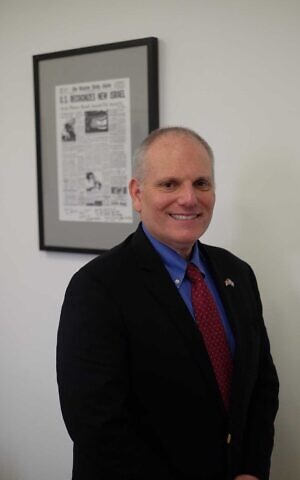
William Daroff, chair of the Conference of Presidents of Major American Jewish Organizations, in The Times of Israel offices on February 2, 2023. (Judah Ari Gross/Times of Israel)
Yet he said he was aware that the plan is currently perceived negatively in the US.
“The discussions that I’ve had have been focused on the perception in America, among American Jewry and in the American government, of how these changes will affect Israel,” he said.
“That is where the focus has been — talking about how the perception of these changes is one that is problematic, and to ensure, as I said, that the policies are explained in a way that will help to shed light on these changes.”
Daroff sat down with The Times of Israel’s David Horovitz, Amanda Borschel-Dan and Judah Ari Gross on Thursday, ahead of his organization’s annual conference in Israel later this month.
Though he pointedly refused to say so definitively, Daroff indicated that representatives from far-right parties would not be invited to speak at the conference. This is likely due to stiff opposition to their views by some members of the Conference of Presidents, notably representatives of the Reform and Conservative movements and other progressive groups, who have publicly stated their refusal to meet with the lawmakers.
In the hour-long interview, Daroff reiterated his opposition to changes to the Law of Return, in light of proposals from the government to cut its “grandchild clause,” which grants citizenship to anyone with at least one Jewish grandparent. However, he stressed that this was his personal view, not the position of the Conference of Presidents, which is divided on the topic.
“My view is the Law of Return is a part of the bedrock foundation of Zionism and what Israel is about. That Israel is a refuge for the Jewish people. And that efforts to limit that run contrary to the Zionist ideal. That’s not an official Conference position. It’s my view,” he said.
What follows is a transcript of the interview, which has been edited for clarity and brevity.
The Times of Israel: Let’s start with Israel’s new government and how its policies might affect you and American Jews and Diaspora Jews.
William Daroff: Bottom line, Israel is a vibrant, robust democracy. Within that context, Israel debating, engaging in these issues, in these divisive issues, is important.
In America, we similarly are in an age of divisiveness. And so when we look at the Israeli political situation, we see a mirror of the same sort of divisiveness we see in America, which is also after some 240 years working through growing pains of democracy. So I think it’s important to look at it in that context.
One thing I’ve been saying to policymakers is that regardless of whether these issues are good or bad, you need to do a better job of explaining them to the American people, to the American Jewish community
Generally speaking, we are deferential to Israeli citizens, to Israeli policymakers, to Israeli voters in how they go about conducting the internal affairs of Israel. But obviously, we have concerns about the tenor of the debate, about the discussion.
And one thing I’ve been saying to policymakers is that regardless of whether these issues are good or bad, you need to do a better job of explaining them to the American people, to the American Jewish community — that the issues are complicated and muddled, and are ones that leave a lot of questions about the intent and the direction that the country is going, and that having a dialogue is important.
That is why we’re here. As we approach the 50th almost consecutive year of doing these [Conference of Presidents] missions [to Israel], it’s about dialogue. It’s about understanding where Israel’s policymakers are and having Israel’s policymakers understand where the American Jewish community is. Our mission here will be, as it has been for nearly half a century, focused on increasing that dialogue and engaging with political leaders from across the spectrum.
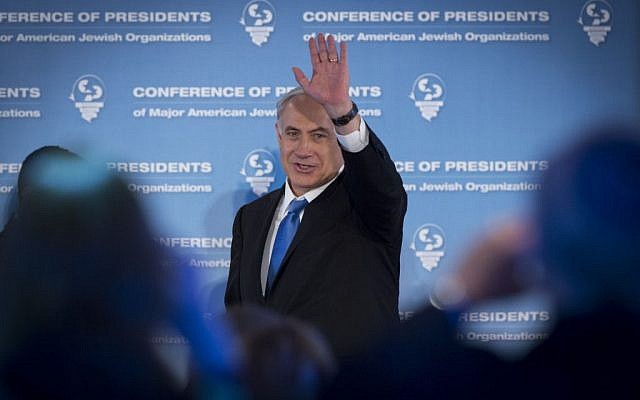
Prime Minister Benjamin Netanyahu speaks to the Conference of Presidents of Major US Jewish organizations, at the Inbal hotel in Jerusalem, on February 16, 2014. (Photo by Miriam Alster/FLASH90)
The formal mission starts on the 19th. Who will you be meeting with?
We have confirmed [US Ambassador Tom] Nides, [Prime Minister Benjamin] Netanyahu, [President Isaac] Herzog, [Defense Minister Yoav] Gallant, [Foreign Minister Eli] Cohen, [Strategic Affairs Minister Ron] Dermer, [Jerusalem’s] Mayor Moshe Lion, opposition leader [Yair] Lapid…
[Otzma Yeshudit chief Itamar] Ben Gvir and [Religious Zionist party head Bezalel] Smotrich are people you wouldn’t want to host?
We are meeting with a broad spectrum of members of the Knesset. At the Knesset we are meeting with two committees that will be holding hearings with us — the Foreign Affairs and Defense Committee and the Aliya and Immigration Committee, as well as having a lunch hosted by the speaker at the Chagall Mural, at which there will be a potpourri of members of the Knesset; we’ve invited representatives of every party, so there will be engagement with every party, to the extent that they show up at the committee hearings and the lunch.
Have you met in the past with Smotrich and/or Ben Gvir?
I have not met with them. As far as I know the Conference has not either.
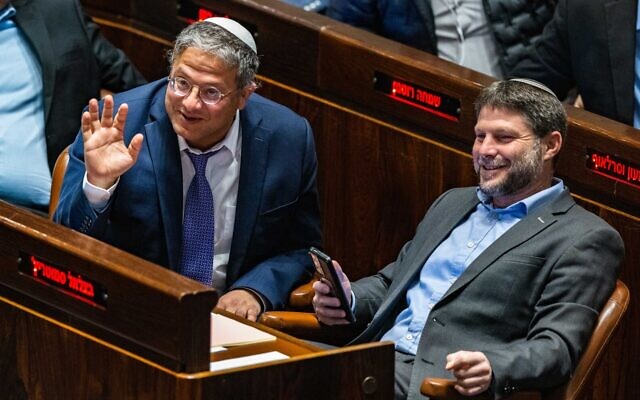
Religious Zionism party head MK Bezalel Smotrich (right) with Otzma Yehudit party head MK Itamar Ben Gvir in the Knesset, on December 28, 2022. (Olivier Fitoussi/Flash90)
The Conference mission lasts for almost a week. And you’ve not invited those two ministers, or MK Simcha Rothman [head of the Knesset’s Constitution, Law and Justice Committee and the son of American immigrants], to speak to the group?
Our last mission was COVID-restricted. Our intent is to be further away from ministers speaking from podia and more to being out and about. So we are very limited in who we’re hearing.
There are some plans by this new government that are Israel-Diaspora centered — such as conversions, the Law of Return. And then there are issues that ostensibly are internal but go to the heart of what Israel is. So first of all, on the issues that are of a direct Diaspora input such as the Law of Return, such as potential changes to the legitimization for citizenship purposes of conversions in Israel and so on, what are your thoughts on those specific issues?
Our former chairman, Rabbi [Alexander] Schindler, the head of the Reform Movement, who was chairman around 1990, set forth a doctrine which is called the Schindler Doctrine within the Conference wherein we do not opine on the issues of religion and state. As one of the few bodies that has the Orthodox, Reform and Conservative underneath one umbrella, this was the mechanism wherein the Conference, 30 years ago, came forth with a way to have a Reform leader as our chairman and also to engage. Generally speaking, we don’t engage officially and formally on those sorts of issues — conversion bill, who’s a Jew, and the like because of the religion and state component of it.
Law of Return isn’t who is a Jew, it’s who’s eligible for Israeli citizenship.
That’s correct.
The rabbinate does not decide. It’s Nativ, which is a political body.
But the Orthodox components within the Conference have a different view than the non-Orthodox components within the Conference about the Law of Return, for instance.
That being said, I did answer a question at a forum in Tel Aviv in November about the Law of Return, where I specifically stated that my view is the Law of Return is a part of the bedrock foundation of Zionism and what Israel is about. That Israel is a refuge for the Jewish people. And that efforts to limit that run contrary to the Zionist ideal. That’s not an official Conference position. It’s my view.
My sense is, from Times of Israel reporting, that there will not be changes to the Law of Return and not to the grandfather clause anytime soon. And I think that that is noteworthy.
I do agree with you and I have said that I think the Law of Return is an immigration issue, not a halachic issue. There are some who disagree because of the obvious domino impact that occurs in Israeli civil society, with folks who are given citizenship and this creates halachic issues.
Beyond that, I think it’s important for Israeli policymakers to know where American Jewry stands on these issues. I think it’s important for us to know where Israeli policymakers are. I am very reticent to engage in a way that puts the Conference in the middle of a partisan political internal debate. However, many of our member organizations are deeply engaged in these issues.
Around our own table, we have discussions about these issues, just like Israelis do and American Jews do around their Shabbat tables. And we for sure find it to be much more effective to speak in private than to speak publicly. That when I’m speaking to elected officials and they know that I come sincerely, I come without reporters in tow, without cameras in tow, without previewing the day before or talking the day after. It gives the Conference much more credibility to actually engage and have impact — the audience being the policymakers who can actually effect change rather than the readers of newspapers, for instance.
Now, let us ask you about ostensibly internal changes, especially the judicial overhaul, which goes to the essence of what Israel is, in which you and all the people you represent have an immense stake. This is the homeland of the Jewish people and this is a country whose foundational principles were that it would be both democratic and Jewish, in a rich and tolerant sense, certainly not in a supremacist sense. Both of those core aspects of Israel appear to many Israelis to be in danger now. Do you have concerns, if so in what areas, and how do you think you might be able to help?
This is an issue that also has a diverse set of opinions within the Conference, similar to Israeli civil society.
We’re certainly concerned about ensuring that the ideal of Israel as set forth by the Declaration of Independence, the quality of minority rights, is upheld. It is important that Israel continues to be seen as a beacon of freedom and democracy in this region. The discussions that I’ve had have been focused on the perception in America, among American Jewry and in the American government, of how these changes will affect Israel. That is where the focus has been — talking about how the perception of these changes is one that is problematic, and to ensure, as I said, that the policies are explained in a way that will help to shed light on these changes.
We’re certainly concerned about ensuring that the ideal of Israel as set forth by the Declaration of Independence, the quality of minority rights, is upheld.
I am a lawyer, not an Israeli lawyer, but I’m a lawyer. And I can attest that looking at the judicial reform bill — and understanding your system is complex — I don’t think it’s as binary as saying that it’s all amazing or it’s all terrible. That murkiness is something that we would encourage there to be more explanations of.
The bottom line is that for us to engage in this very divisive, critical issue, that is creating its own political and constitutional crisis here, the best way to engage in that is not in the pages of The Times of Israel, but is to engage privately with the parties — to help guide them in a more productive direction.
You’re talking about the perception and a murkiness rather than the substance.
I don’t really want to opine on it, but the arguments I’ve heard on both sides make it clear to me that it’s not binary. I think a reasonable argument has been made that the system is not perfect. And the question is, are the reforms that have been proposed the right proposals to help perfect the system?
You’re talking about listening to different people and then being able to guide. Who are you guiding?
Looking to guide Israeli policymakers to incorporate the views of American Jewry in their policymaking.
So you see yourself as an ambassador of American Jewry, speaking in a nonpartisan, non-religious kind of role — a sane voice and an objective voice?
Absolutely. I see the role of the Conference as being an interlocutor, an ambassador, between American Jewry and the Israeli government, Israeli civil society, the American government, American civil society, as well as other governments across the world where we engage on behalf of the interests of the American Jewish community in those countries. Engaging with a country on behalf of their own Jews, for instance, there are some countries where our relationship with the political leadership there is better than the local Jewish community has with their political leadership, where we’re able to use the weight of American Jewry in order to get attention in a way that the local community can’t, as well as engaging with countries, like in the Gulf and elsewhere, where it serves American interests, American Jewish communal interest.
Are you concerned that this is a worrying moment for Israel, that we have a very hard right government whose declared agenda includes, apart from the legal overhaul, legislation that would enable you to refuse to provide service on the grounds of it countering your religious beliefs. There was talk about lifting a ban on racists running for the Knesset. These are stances that do not seem to comport with the ethos and values of the Declaration of Independence. Is that a perception around your Conference table?
In the conference, we work by consensus. We generally do not take votes. We look to see where the consensus of the groups are, in a way that brings together the 53 organizations rather than dividing and bringing them apart.
The powers-that-be here should seek consensus, should find ways to push forward policy proposals that bring together the Israeli people rather than divide them
There is certainly a concern that, as Israel looks to engage in these major changes, the powers-that-be here should seek consensus, should find ways to push forward policy proposals that bring together the Israeli people rather than divide them.
So I am encouraged, for instance, by efforts by President Herzog to bring people together to find consensus. Without opining on the substance of the underlying issues, I think bringing people together, finding consensus, and looking for ways to decrease divisiveness in society would be a noble pursuit.
Are you concerned about Israel increasingly alienating itself from parts of the Diaspora? Or do you not see that happening? Are you hearing concerns in the American Jewish community about what is happening to Israel?
For as long as I can remember, the American Jewish community has had concerns about Israel, about various components of Israel, about various initiatives, about how Israel conducts itself on a potpourri of issues. And that certainly continues today.
I do believe that the rancor here is one that does promote rancor in America among American Jewry, and that there’s certainly a concern about that divisiveness.
What did you make of the secretary of state, on his visit, weighing in publicly with a long list of “Hey, remember what democracy is”?
The place where the Conference can have the most impact is in the bilateral relationship between the two governments, between the White House and the Prime Minister’s Office, between the Congress and the Knesset. And our goal is to ensure that despite the noise, despite the news cycles, despite the crisis of the moment, that whatever the crisis of the moment is, whether it’s a terror attack or an IDF Jenin incident, that there are lines of communication that are open between the two governments, that there is a common language and that there’s a process in place to ensure that the relationship doesn’t go off the rails.
What we’re seeing from the US and from Israel is a process to decompress and to engage together. Tom Nides has been spectacular in engaging with the political leadership here. And then that continued with [US National Security Adviser] Jake Sullivan coming, to work through some more of the specifics, and then Secretary [Antony] Blinken to put the icing on the cake. Presumably, the next step will be the prime minister and the president meeting sometime in the next couple of months.
It is noteworthy and commendable that they’re working through these issues and that they are intentionally looking to ensure that the discussions happen privately, behind closed doors.
Have you met with Amichai Chikli, the new Diaspora affairs minister, yet?
Via Zoom. We’d met previously, but the Zoom and WhatsApp discussions I’ve had with him since [he took ministerial office] have been more intense. I’ve developed a deeper relationship with him over the last month.
Do you see him as a significant conduit in terms of American Jewry speaking to Israel?
I understand Chikli’s had a lot of meetings. I understand he’s had two conversations with [US Reform leader Rabbi] Rick Jacobs, for instance. I’m impressed so far. He is looking to be engaged with the full mosaic of American Jewry and to be a conduit for engagement here, as well as taking over [responsibility for tackling] the delegitimization and antisemitism [issues]. So in that context also, there will certainly be engagement. So all signs are positive. We have good interaction. He seems to be very engaged and he’s been outwardly focused on trying to work with us and get to know the American Jewish community.
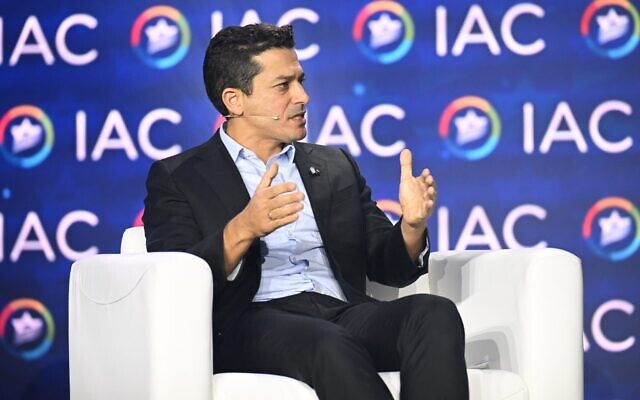
Diaspora Affairs Minister Amichai Chikli speaks during the annual conference of the Israeli-American Council in Austin, Texas, on January 19, 2023. (Shahar Azran)
In terms of the declared direction of this government, in the context of the battle against BDS, does it make the battle harder if you’ve got a government that seems to be set on a particularly difficult course? When you have some mainstream Israelis using the “fascist” word against the Israeli government?
I think it’s important for all parties to use language that is appropriate, respectful and proportionate to the issues involved. Calling anyone who criticizes Israel an antisemite is wrong. Certainly, antisemites criticize Israel a lot, but certainly not everyone who criticizes Israel in any given issue is as antisemite. Just look again around your Shabbat tables and our Shabbat tables. I encourage a tone that brings people together, that tries to cut through the divisiveness and will lead toward a consensus. Obviously, language that demonizes one’s opponents, whether from the left or the right, is unhelpful.
The last time we spoke was a little bit after the British Board of Deputies had told Bezalel Smotrich to get back on his plane. You and [the Conference’s longtime executive vice chairman] Malcolm [Hoenlein] were generally deferential and sought to keep [such attitudes] private. Within days of the election, some of your member organizations were openly referring to members of this government as racists, homophobic, bigoted, you name it. Is the US Jewish policy of deference going to last?
There are elements of the American Jewish community that are supportive of every element of the Israeli political system. There are elements of the American Jewish community who have an affinity toward the Labor Party. There are elements of the American Jewish community who have an affinity toward the Religious Zionism party. It wouldn’t surprise me if those various elements hosted the members of Knesset with whom they have an affinity for events in America.
There are probably many more American Jews who are supportive of Labor than Religious Zionism. If you’re saying that the Conference is looking for consensus, that suggests small minorities have a disproportionate amount of control over what the conference does and doesn’t say. So how do you see your role in terms of representing American Jews as a group?
We’re seeking consensus within the Conference. Unity doesn’t mean unanimity. So there are a variety of different viewpoints that are represented. We have discussions internally that help us seek consensus and help us assess how to address these issues. Will Smotrich be a persona non grata in America? There are some American Jewish groups that have an affinity for him and his party who, my guess, would make him persona grata.
You choose very carefully when to speak and when not to speak, dancing between raindrops… When you’re seated around the Conference table and the more conservative Orthodox elements know that you’re not going to raise a fuss over conversion or things like that, does the more left-leaning element use this and say, Hey, let us, yes, take a stand about this particular issue? Is that in the mix at all?
Our table is not really one where there’s horse-trading per se, where there’s that sort of bargaining. Our position is baked in to the DNA of the organization at this point, after 30 years. But again, we have discussions about these issues. We just don’t opine on them. There’s a dialogue that occurs amongst the organizations at our table, looking for common ground, looking for consensus, looking for a way to bring together disparate parts of the community. What the Schindler doctrine does is keep us from speaking publicly about these issues as a way of encouraging that internal dialogue and encouraging a place where folks, regardless of the size of their kippa, feel like they can sit and have that discussion.
You say there are parts of the American Jewish public where Bezalel Smotrich and Itamar Ben Gvir are persona non grata. Since you’re looking for consensus, does that mean that they’re not going to appear before the Conference of Presidents?
I meant they’re likely not going to appear at the Americans for Peace Now banquet, for sure.
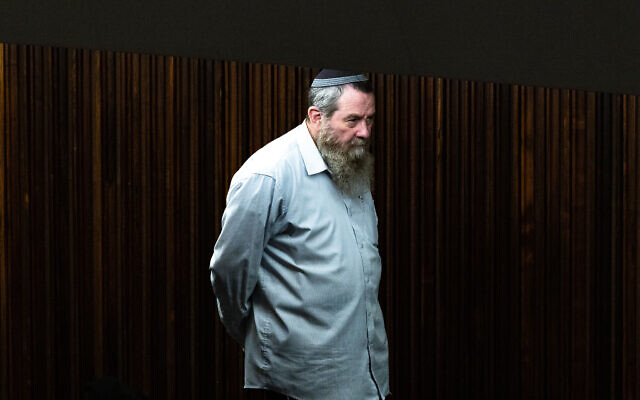
Deputy Minister Avi Maoz seen during a vote in the assembly hall of the Knesset, on December 28, 2022. (Olivier Fitoussi/Flash90)
But if Americans for Peace Now say he’s a red line for us, does that mean he’s not going to appear at the Conference of Presidents? Or take Avi Maoz, who is reportedly looking to limit the ability of American organizations and American foundations to put funding toward initiatives in the Israeli education system…
On many of these issues, we’ll follow the guidance provided by the prime minister that the buck stops with him and that he is responsible for the actions of his government. That’s what he told the American government. That’s what he told Bari Weiss. And I think Jake Tapper, too…
As it relates to issues like that, it will fall back on the prime minister to ensure that on LGBT issues, for instance, that the government doesn’t go off the cliff.
A final question, coming back to what you were saying at the beginning about concerns about the murkiness and the way that this is being presented, as opposed to concerns that Israel is on a dangerous path and is facing a moment of crisis. Is it the case that you do think it’s a moment of crisis, but you’re constrained in saying so, or that you think the critics are hysterical and overreacting? Is it that you think that the way to handle any such concerns is a behind-the-scenes, quiet approach?
Certainly, a behind-the-scenes approach is, in my view, more effective. I think there is a crisis of divisiveness here in Israel, where the country is being torn apart by political issues. There have been five elections of divisiveness. And much like in America — where as I described before, where we’re in this era without comity –that has continued here.
There’s a crisis in both countries of divisiveness, of not finding consensus, of political issues being weaponized into something more than they should be. That is of great concern.


